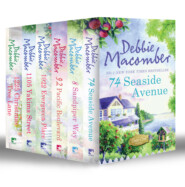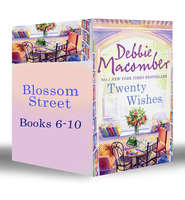По всем вопросам обращайтесь на: info@litportal.ru
(©) 2003-2024.
✖
1022 Evergreen Place
Автор
Год написания книги
2019
Настройки чтения
Размер шрифта
Высота строк
Поля
Her attitude annoyed him. “Same here,” he responded, matching her tone. What was this woman’s problem, anyway? She seemed to disapprove of him for some reason, even though she knew next to nothing about him.
Shirley appeared to notice because she looked quickly from one to the other.
“I was just telling Miranda how grateful I am for all your help with Tanni and Shaw.”
He bowed his head. “I was happy to be of assistance. Shaw is a talented young artist who deserved a hand up.”
Miranda smiled cynically but didn’t comment.
“Speaking of Tanni, I see she came, after all,” Shirley said breathlessly. “If you’ll both excuse me for a moment, I think I should check on her.” She headed toward the door, leaving Will alone with Miranda.
He didn’t usually take an immediate dislike to anyone, especially a woman. He supposed he was reacting, at least partially, to her dislike of him. He couldn’t understand it, unless she’d heard rumors…. Perhaps his reputation had preceded him. However, he wasn’t particularly worried. Instead, he made up his mind to treat her as a challenge. She was Shirley’s friend, and if he could make her an ally, his chances with Shirley might improve.
“So you’re a good friend of Shirley’s?” he asked.
“A very good friend,” she told him, and brought the flute to her lips. “What makes you ask?”
She was direct and, as he’d guessed, didn’t seem too fond of him. Switching tactics, Will decided to be equally direct. “The look you gave me.”
Her dark eyebrows arched slightly. “I gave you a look?”
“Didn’t you?” he asked.
“No.”
He smiled softly and had to admit he was rather amused by this silly game. “Liar.”
She laughed. “The fact is, Mr. Jefferson, I don’t think I like you.”
He should’ve asked why, but the truth was, he didn’t really care. He met her eyes. “Actually, the feeling is mutual, but we do have one thing in common—our high regard for Shirley.”
Miranda answered with a short nod.
“So that gives us common ground, agreed?”
She studied the bubbly liquid in her glass. “Agreed,” she finally said.
“Don’t you feel it would be easier on Shirley if we made an effort to get along?”
This required more consideration on her part. “Perhaps.”
“On a different but related matter, I’m looking for someone who’s knowledgeable about the local art community to pitch in at the gallery when I need it.” He remembered what Shirley had told him about Miranda’s husband. “I gather from Shirley that you’re eminently qualified,” he said. A stretch, perhaps, but whatever worked … “Would you be willing to consider doing that?” He really could use the help, she could probably handle the work and, with her at the gallery, he might be able to gain information about Shirley. In fact, this idea might be impetuous but it was a stroke of genius.
“My husband was an artist,” she murmured.
“Hugh Sullivan, the landscape painter.” He made a mental note to do some quick research on Hugh.
She smiled, a smile he found a trifle condescending. “I’ll think about it, Mr. Jefferson.”
“Good.” He seemed to be winning her over and that pleased him. Now he had the larger task of working his way into Shirley Bliss’s affections.
With—he hoped—the blessing of her friend Miranda.
Four
Sunday afternoon—more glorious weather. As Mack worked in the yard, Mary Jo diligently washed the outside windows. She’d gone to church earlier that morning while Mack was finishing his overnight shift at the fire station. He got home at about the time she returned from services and they’d decided to spend this beautiful afternoon outdoors.
Mack reveled in the sense of peace and companionship he felt as they both worked quietly; he seeded bare portions of the lawn and she cleaned every window and wiped down every sill. Since Noelle was asleep inside the house, Mary Jo kept her front and back doors ajar so she could hear the baby. When they were done, she and Mack made small talk, complimenting each other’s work, then put away their supplies. The windows gleamed from their washing, the lawn was greening and the garden—vegetables and flowers—now looked like a real garden. The lettuce leaves had started to sprout and Mary Jo had planted pole beans, corn and peas earlier in the week. The bulb flowers had sprung up in vivid color.
“I need to go to Wal-Mart,” Mary Jo announced at about four o’clock.
“Do you want company?” There was nothing he needed himself, but he couldn’t think of anything he’d rather do than spend time with Mary Jo.
“Sure, if you want. I have to get diapers and a few other things. I won’t be long.”
“I can take you out to eat afterward, if you’d like.” He spoke casually, but his heart pounded with anticipation. It seemed that whenever he was making headway in this relationship, something would set the whole thing back. He knew he had to tread lightly with Mary Jo.
“You don’t have to take me out, Mack, but thanks.”
“It’s the least I can do,” he argued. “To pay you back for all the dinners you’ve made me.”
“No, really, I’m happy to have your company. Besides, I’m used to cooking for my brothers. I always make far more than one person could eat, anyway. You’re actually doing me a favor.”
That was exactly what he’d told himself earlier in the week, but he didn’t like hearing it now.
He shrugged, smiling, as if her comment amused him, although what he felt was frustration. How was it that he could fall in love with the one woman in the world who was determined not to venture into romance again? He could only hope she’d eventually start to trust him, eventually return his feelings….
Noelle was awake and cheerful when Mack, having showered and changed, joined them in the driveway. He picked up the baby seat and made silly noises that delighted Noelle as he fastened the carrier in Mary Jo’s car. She’d suggested they take her vehicle; he offered to drive and she accepted.
On the way to Wal-Mart, they said very little.
“Have you found out any more about the letters?” she asked after a while.
“I thought of something that might help us,” he said.
“What?” Her interest was immediate.
“In one of the letters, the one where Jacob mentions eating fish and chips, he wrote about being raised in the Pacific Northwest.”
“Yes, I remember,” Mary Jo murmured. “So he wasn’t just at a base in this area, it was also his home.”
“Right. So, it should be easy enough to check local high school records from that time—say, the mid-thirties through early forties. Her surname might have changed, but not his.”
“Maybe we can learn his family’s address that way,” she said excitedly. “I’ll start checking them out tomorrow. Also, could you talk to your friend?”
“My friend?”
“Yes, our landlord. Maybe he can tell us about the previous owners, or at least the most recent ones.”











